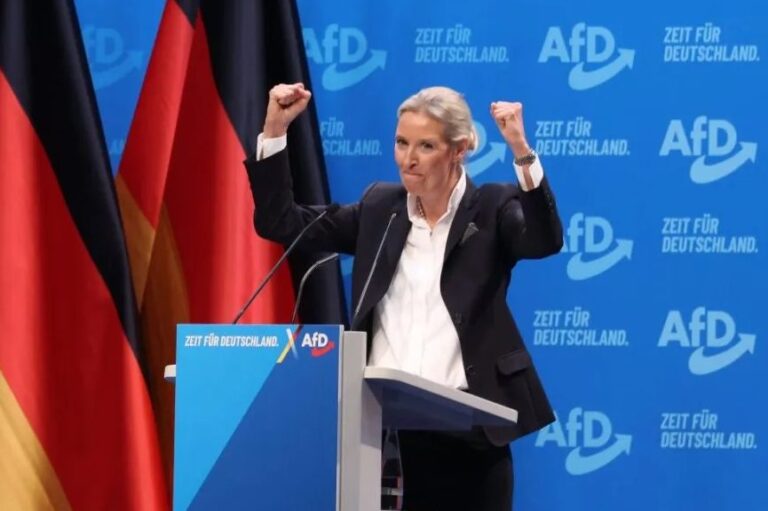With less than six weeks until voters head to the polls, Germany’s snap election campaign is heating up. The AfD is expected to turn one-third of Germany blue and win five of the country’s 16 states in the party-list vote: Mecklenburg-West Pomerania, Brandenburg, Saxony-Anhalt, Thuringia and Saxony. This will give the party around 19.7% of the vote and 146 seats in the Bundestag.
These predictions dispel the idea that Germany has moved on from its divided past.
Just in time for the weekend, pollster YouGov released its first MRP survey, revealing the likely voting intentions of Germans at national, state and district level. The results make grim reading for Germany’s established political parties, which want to maintain a firewall against the far-right rebel Alternative for Germany (AfD) party.
All but one of the other states are expected to succumb to the conservative CDU, led by Friedrich Merz, who is most likely to become the next chancellor. They are on track to win 29.8 percent of the vote, or 222 seats in parliament.
The division between the states, with AfD versus CDU predicted to prevail, is notable for one reason in particular. Geographically, the division lies precisely on the border separating former East and West Germany. These predicted results therefore completely dispel the idea that Germany has moved on in any meaningful sense from its polarized past, just over 35 years after the fall of the Berlin Wall.
The YouGov investigation was conducted over six weeks and included intervention by American tech billionaire Elon Musk on behalf of the AfD, as well as a chat with party co-leader Alice Weidell on the X show. . Interestingly, there is little evidence that Musk’s declaration that only the AfD can “save Germany” boosted AfD votes; if anything, AfD’s predicted vote share was calculated before Musk and Weidell’s interview. That’s about 2 percentage points lower than the previous poll suggested.
Current Chancellor Olaf Scholz still harbors dreams of returning to Berlin for a second term, and it is becoming increasingly clear that his hopes are in vain. His Social Democratic Party, the SPD, came in third place in the party list vote with a slightly lower-than-expected 15.6 percent. The only state the SPD is predicted to win is the Berlin city-state, amid damning accusations about how Germans view his party, but that it only represents the interests of metropolitan elites. It does little to enhance their reputation.
If Scholz is lucky, the SPD will be asked by the CDU to join the government as a junior coalition party, but whether Scholz remains the party’s figurehead is another matter entirely. It is also possible that Merz will turn to the Green Party, which is expected to win 13.6% of the vote, to form a coalition government.
For Scholz’s former coalition partner, the FDP, party leader Christian Lindner’s gamble to break away from the Traffic Light coalition and separate from the Tank government in November appears to have backfired. According to a YouGov poll, it is currently expected to fall below the 5% threshold needed to return to parliament.
The far-left party Bundniss-Saala Wagenknecht (BSW) may also view this result with disappointment. A year after its founding, when it seemed to be gaining momentum and popularity in the face of pacifist anti-Ukrainian stances, the party appears to be losing momentum. The poll’s approval rating of just 6% – just one point above the parliamentary threshold – further infuriated party officials who had previously criticized party leader Safra Wagenknecht’s minimal campaigning. I’m going to let you do it.
Germany’s federal elections are scheduled for February 23, and the country’s establishment parties will be hoping that a lot can change in the meantime. But one thing is becoming increasingly certain. That means while the CDU is expected to win the election, the AfD is the party on track to truly take control of the Bundestag.


